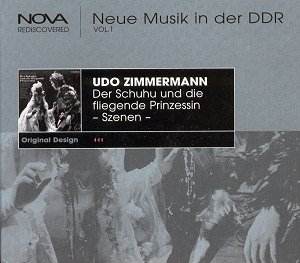Udo Zimmermann, not to be confused either with Bernd
Alois Zimmermann (1918 Ė 1970) or with Walter Zimmermann (born 1949),
has several operas to his credit of which Der Schuhu und die fliegende
Prinzessin is his fourth essay in the genre.
Zimmermannís opera Der Schuhu und die fliegende
Prinzessin is based on Peter Hacksí eponymous fairy tale published
in 1964 and dramatised some time later. It was commissioned by the Dresden
Staatsoper and premiered by them in 1976.
The libretto tells an improbable story, as befits a
fairy tale, in which a poor tailorís wife lays a large egg containing
a Schuhu, i.e. man and owl at the same time. The strange being is wiser
than any other people in the city. The appalled father casts the Schuhu
out unto the streets from where he sets out to see the wide world seeking
to enter the service of some high person. He thus appeals to the Grand
Duke of Coburg-Gotha who refuses him any job because the Courtís Schuhulogist
deems him a fraud. The Emperor of Mesopotamia employs him as a night
watchman for his seventeenth garden. The Schuhu and the flying princess
(actually the daughter of the King of Tripoli) fall in love. Both the
Emperor and his brother, the Grand Duke, vie for the affection of the
princess, and are locked in an brotherly war. Nevertheless the brothers
join forces, but suffer a crushing defeat. The princess, however, falls
in love with a Dutch dignitary and elopes with him. Of course, her new-found
love does not last and she yearns for the Schuhu again. The Schuhu has
in the meantime discovered an almost inaccessible land where everyone
seems to be happy. Back to the "normal" world, he fetches the princess
and everyone follows him in the new-found land.
Such fanciful tale with, nevertheless, more than one
touch of irony or social criticism, is treated in a boldly eclectic
manner, i.e. musically speaking. Zimmermann uses a whole array of techniques
and devices of late 20th Century music. This richly colourful
score alternates moments of great beauty (often achieved with quite
simple means) and episodes of some more aggressive character, this dichotomy
evoking the clash between the "normal" world of men and the dream world
of the Schuhu. There are indeed many beautifully lyrical passages, often
accompanied by ecstatic wordless vocalises from the chorus and many
fine orchestral touches. The violence and the heartless stupidity of
the "normal" world are often expressed in a more brutal, sometimes crudely
expressionist way including dissonant clusters, Sprechstimme
(sometimes developed into dense counterpoint) and what sounds to me
as electronic music or computer-generated sounds. A nice touch, that
aptly sets the scene, is the opening music of the opera in which a recorder
quartet imitates a barrel organ (while the conductor is seen on stage
churning a barrel organ) accompanying a folk-like ballad sung by the
tailor. A similar mood is recalled at the beginning of the last scene
(solo violin supported by hesitant woodwind reminiscent of the barrel
organ music of the first scene) whereas the scene ends with dreamy vocalises
slowly dissolving into space.
The present release offers a selection of scenes from
the opera, which helps in getting a fair idea of the whole work. All
singers, I must confess, are totally unknown to me, but unite in a dedicated
rendering of this all-embracing, colourful score. The 1978 recording
still sounds remarkably well. Excellent notes in German and English,
but no text included. Well worth investigating for Zimmermann seems
to me to be a born opera composer, and I really wonder what his other
operas may be like.
Hubert Culot


